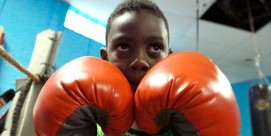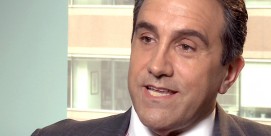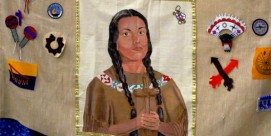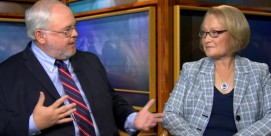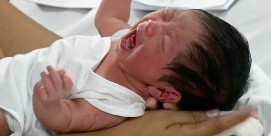In This Episode << SLIDE LEFT TO SEE ADDITIONAL SEGMENTS
Father Leo Extended Interview
Read more of Kim Lawton’s interview with Father Leo Patalinghug, director of pastoral field education at Mount St. Mary’s Seminary in Emmitsburg, Maryland, and watch him talk about his television cook-off with celebrity chef and restaurateur Bobby Flay:
Q: Tell us a little bit about how you started cooking.
A: My love for cooking started just because I like to eat, and my mom would bring me into the kitchen when I was younger. After doing my activities I would get bored quickly. Mother would invite me to help her with cooking because it’s a multitasking thing and that actually piqued my interest.
Q: And where did you grow up? Talk a little bit about your memories of your family coming together over meals.
A: Being a traditional Filipino family growing up in Baltimore, I joke with people and say the reason why I had friends as a kid was because my mom cooked so well, and so we would eat traditional Filipino food, so for me to go to my friend’s house and eat Mac ‘n Cheese was exotic. But we had a real sense of eating together as a family. Every meal was together.
Q: Did faith play a role for your family as well when you were growing up?
A: Because we were immigrants, my mother needed a connection back to her own homeland, and the universality of the Catholic Church gave her that. In fact, we moved in location to our church. She would only go to a place, a home that was close enough where she could walk with her children to church.
Q: And did you have that memory of eating together—you know, food, grace before meals—there?
A: My family style of eating is very much a feast day celebration and yes, we prayed before every meal, and it was something serious because in my country not everyone gets a chance to eat. And so they reminded us that even though we were living in America, a land of plenty, there are a lot of people who don’t have the blessings on the table as well as the blessings around the table.
Q: Let’s jump over to your journey to the priesthood. Tell us a little about how that happened. I know that wasn’t necessarily your original path that you started on.
A: No, the original path for me was to do something in journalism or to do something in law. But at the same time I wanted to do something that was service-oriented, and it was only after what is now known as a conversion I realized that there is a God, God has a plan for me, and after a few years of discerning that, praying through it, going to retreats, I felt at peace in this calling and this lifestyle, even though most of my friends would be very surprised I decided to become a priest. I was 29 years old when I was ordained. I entered when I was 24 years old.
Q: What was happening that led to that conversion or led you to really start listening and seeking, is this something that is for me?
A: I think I was given a great, for lack of a better word, grace/opportunity to think about the big picture in life: What do I want to do? I was a deeper thinker than most. I wanted to not just take care of the temporal things, but knew that there was emotions, that there’s a spirit to people and how can I help with that? There were many events that made me turn to God and prayer, whether it be a major skiing accident, whether it be a breakup with a girlfriend, whether it be trying to find the right job, whether it be a very special moment of prayer. And there was one in particular when I went back to the Philippines and I was working—not working, I went back to the Philippines and I was a participant in a world stick-fighting competition because I was a martial artist, and I was with the USA team, and we had brought some supplies over just to give to some of the poor children in the area. I remember going to this one village and we were handing out candy to people and there was one little boy who only had a t-shirt on and he came up to me and I gave him a piece of candy and I looked in his eyes and I thought to myself, had it not been for my dad bringing us to America, that could have been me, and it just made me stop and think of the hunger of the people in the world. But even though this was a poor baby, he had a bigger smile than some of our children who have plenty to keep them occupied. And so I began to think more deeply of that and obviously through the assistance of good priests as spiritual directors and confessors, I was able to come to a peace that maybe God is calling me to the priesthood. So I walked into a seminary and six years later I was ordained a priest.
Q: Did that freak you out when you even started considering that possibility?
A: Yes, it was a very shocking thing. I actually played a joke on my mother. It was Halloween, and I was in a cast and I was teaching karate, and our karate school was having a big Halloween costume [party], and I couldn’t think of a costume with this cast on, and I was going to be a mummy but that was just too much cloth. So I had this black shirt on, I had a white thing around my neck, and I looked in the mirror and I thought, “Oh gosh, I could pull this off.” So I wrapped it around and it looked like a priest collar! And I remember crutching into my mother’s room and showing her. She was obviously very shocked and all the karate students at the time said, “You look good in that.” But it was a real shocker when I put it on for the first time as a seminarian.
Q: How did you start incorporating the cooking after you started going down the seminary/priesthood path? How did the cooking come into play there?
A: Well, the cooking has always been a part of my whole family’s life, and when I studied at the North American College in Rome, I realized the importance of a family meal, that seminary required the men to come together for every pronzo, which is a lunch or a supper, dinner experience, and so coming together we developed more than friendships. We developed a brotherhood, and that was abundantly clear being so far from my family that Thanksgivings, although I missed being with my family, were nonetheless special because I was with this family celebrating a meal. As far as it becoming a ministry, it’s basically the natural becoming more apparent, simply because families in the parish would invite me to come to their home for dinner, and that was code word for, “I’d like to talk to you, Father, about something.” So I would actually show up, but about forty-five minutes earlier, which really shocked them. But I wanted to see them interacting normally. I didn’t need them to put on a front. I needed them just to be a family, because they call me Father. I’m supposed to be part of their family, and so I would help them. We would gather in the kitchen. We would help cook, I’d help set up the table, and they saw the human side to me and not just the spiritual side. They realized that as I priest I had just as many feelings and questions and needs to pray about as they do. And in that camaraderie around the table I began to think theologically: this is what Jesus did. Most of his greatest lessons were taught around a dinner table.
Q: What is that connection between food and spirituality?
A: Food and spirituality’s connectors are so evident, because it addresses hungers. What are we hungering for? If it’s just food without company, then we could be living a very secluded life. That’s why we make an effort to reach out to people on those holidays. How? Through soup kitchens. Through handing out food. The word “religion” is something that everyone’s afraid of, but the Latin verb is simply religere which means “to bind.” What brings people together and in what forum? We believe, at least in the Catholic Church, what binds us together and what binds God to us is food—piece of bread turned into the body and blood of Christ in which we are incorporated into his family, and so when we look at food as a connector, we not only look at the hunger, we also look at what we’re being fed with, and so we think that food can also be inspiring.
Q: I’ve watched some of your shows on the Web, and I know that you talk about being fed mind, body, and soul. What’s that all about?
A: Being fed body, mind, and soul is a reminder that people can’t just live in the corporeal world, just to address the earthly things that make me feel good in body, because I know a lot of people who feel good in body, but their minds are so distraught with either guilt or shame and their heart is broken because of maybe of a bad relationship. People walk around this world with a great mask looking very good in the body but being very broken in the insides. My objective is to make sure that there is a connection, to not live a dualist spirituality, to live in this world as, the word is “hypocrite,” which means “actor.” I’m very happy on the outside but broken on the inside. We need to bring those two together.
Q: When you started doing the cooking shows that went online, why did you decide to take that route? You’re doing it for your parish; you’re doing it for the fellow priests and all of that. Why did you decide to go public?
A: Going public—I mean, there are so many angles to answer this question. The “Grace Before Meals” started because I simply took a hobby and I put it in God’s hands. He turned my hobby into a ministry. It became very apparent to me that people wanted this, hungered for something like this. If I could say, after September 11, it really was September 11, we know what happened, 2001. I was actually supposed to go to France on a pilgrimage with two other priests, but all the flights were canceled. So after a very tragic weekend worth of Masses, where the churches were full, hungering for an inspiration of hope, we ourselves, the ministers, we were spent. So we went a little retreat together, and I did all the cooking—comfort food. And it really made it a clear message that we were all hungering for support from one another. So one of the priests suggested, “I love watching you cook. It would be great if I had a video camera and taped all of this. You could talk about food, faith, family and culture.” And I looked at him and said, “That’s one of the dumbest ideas I have ever heard.” But they kept egging me about it, and so I kind of took it seriously, but half seriously-half jokingly said, “Oh fine, well let’s do that and we’ll call it Grace Before Meals.” I thought that was the end of the story until one day when I was in the sacristy where the priests vest, and I was disrobing from the liturgical vestments, and a man walks in wanting to meet the new priest, me. And there was another priest there who was “inside” on that joke. He started coming to church regularly because he was looking for meaning. His son has autism and that’s hard for a family. So we started to go to daily Mass. In meeting him I just generically asked, “What is it that you do, Tim?” He said, “Well, I produce TV shows and commercials for Comcast.” Immediately the other priest said, “Well I’ve got an idea for you!” And I’m looking and going, “It’s a joke.” He said, “It’s called Grace Before Meals, it’s a priest cooking show.” I didn’t think anything of it until I get an email, and he says, “Father Leo, I’m flying in red-eye from LA. Can I have a breakfast meeting with you to discuss GBM?” It’s now given an acronym. I didn’t even know what “GBM” is. I tell people I thought he was talking about the “Great Blessed Mother” But he simply said, “I’d like to discuss in a Hollywood minute, which is thirty seconds or less, what’s Grace Before Meals.” I told him it’s a joke. He said, “No I’m serious.” So I said, “Fine. Grace Before Meals is maybe a show or a movement about a priest helping families, strengthening their relationship the way Jesus did, and it’s ultimately my responsibility to feed people body, mind and soul.” He said, “I love it.” And I said, “You’re sick” And from there, a very slow start, it’s turned into a pretty big movement.
Q: How do you balance that, the movement, with your responsibilities here at the seminary, your responsibilities as a priest? I know this is your ministry, but do you ever feel there is a conflict, or do you get pulled in different directions?
A: I’m blessed to have a rector, an archbishop, and faculty and seminarians who see the need to not live many ministries, but to try to bring them together as one. So this is connected to what I do here. As the pastoral field educator, my job is to teach future shepherds how to feed their flock. I teach a preaching class, which means I can’t have guys dishing out stale, boring leftovers, but dynamic things that are going to make their appetites just expand, and to whet their appetites to show that what we have to offer is good news. You can take corned beef hash, but if you put it on a beautiful square plate, make sure that the potatoes are perfectly scalloped, normal ordinary food becomes something worth celebrating. So, to a degree, this is my job. Does it put a strain on my schedule? Yes, which is why I make sure that I master my schedule rather than it master me, and also I have great access to spiritual companions who help me to keep focused on what it is that I’m supposed to be doing.
Q: I well know, being in front of the camera, being out there can have almost a seductive aspect to it, where you like being in the limelight. It can pull you in. Is there a struggle for you as a priest, to keep that humility virtue when you’re getting all the accolades and people want to get your autograph and all of that?
A: I guess the celebrity status could be a temptation for anyone. But as a priest I’m somewhat protected in this. I’m required to spend time in quiet prayer and reflection. A holy hour a day gives me a great perspective, and honestly, Leo, you’re not that good looking. You should be taller and more blonde. You should have straighter teeth. You should be thinner. I’m just me doing something good for God. I know ultimately what my faults and failures are because of confession and because I spend time in prayer. If there’s one thing that has actually been helpful about being in front of a camera, it has taught me patience and humility. Hurry up to wait, and then I look at myself or listen to myself and say, “Is that what I look like? Is that what I sound like?” I’ve got to approach this ministry seriously, but not take myself seriously.
Q: It’s very clear that you have fun and that you try to have fun with this and project a really fun image. I’ve seen you online break dancing and doing other stuff like that. What do you make of the image of priests that you’re projecting, especially given the stereotypes many people in the wider society might have?
A: If there’s anything that “Grace Before Meals” has been able to do, it’s to shatter some of those stereotypes. We are human just like everyone else. But we’re not satisfied with that. We want to be better at what we do, and God uses even our broken past to help us turn toward a better future. A lot of people are surprised that before I was a priest I used to teach martial arts, third-degree black belt structured taekwondo, full-contact Filipino stick fighting on our knees, I wanted to either be a journalist or a lawyer, I used to teach speech and debate, and yes, the rumor is true, I used to break dance. You take a guy like that and the next logical step is priesthood, right? No, it just shows that God can use anything if we are willing to give it to him. Who would have thunk in a million years that cooking a meal with a family would inspire so many people around the world who email me and say this has been an inspiration for me. Who would’ve thunk? If we’re generous with who we are, and God has given all the priests tremendous gifts and talents, if they’re willing to put that in his hands, he can turn six fish sandwiches into a feast for five thousand. He can take a break-dancing, board-breaking, bread-breaking priest and give hope to people who might not understand the church or might not understand a priest. It’s just one more connection that I’m not ashamed of, because Jesus used food all the time to make connections with others.
Q: I know you say your bishop and seminary have been very supportive, but are there other folks who say, “I don’t really think a priest should be doing this”?
A: Absolutely. I have experienced enough criticism just because we’re public people. But priests are going to experience criticism all the time by the evangelical message which might be hard for people to accept, by other religions that might not agree with the dogma. But one thing we’ve got to do is live on this earth together and help each other get to heaven and maybe one thing I can do is bring people closer to the table by sharing with them a little bit of our culture through food and maybe learning a little bit from them too. I’d love to have an opportunity to have either a show or a radio show, and “A Place at the Table” is what I’d like to call it, where we can just bring people of diverse opinions together, share a meal, celebrate what we have in common and respectfully discuss what we don’t have in common, and if there’s anything that we have in common it’s that: Was this food tasty or not? Are you walking away unsatisfied or dissatisfied? I think it’s one of my personal objectives to make sure I can feed people at least on one level.
The family is important to “Grace Before Meals” because I think families have bought into the fast food mentality, which basically says I’m too busy for you. I’m too busy to care about what you’re eating. I’m too busy to care about who’s feeding you. And there was a commercial at one point that said, “It’s ten o’clock, do you know where your children are?” Just rephrase the question: It’s dinner time; do you know where they are? Do you know what they’re eating? Do you know who’s feeding them? Because it’s easy to swallow a bunch of lies, and this about the family being the infrastructure of society, the basic building blocks for society, we know that families are buying so much into the fast food mentality that they spend no time with each other. My objective for “Grace Before Meals” is to create mini-Thanksgivings throughout the year, a time to celebrate the blessings we have not just on the table, but around the table.

